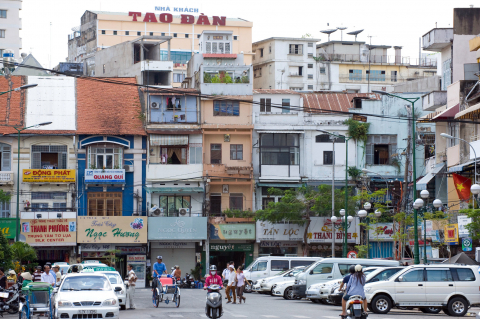You are here
Tuberculosis (TB) is the world’s deadliest infectious disease, claiming an estimated one billion lives over the past 200 years. Today, approximately 90 percent of the world’s TB burden is concentrated in just 30 countries, and among these high burden countries, Vietnam ranks eleventh. The government of Vietnam is working with the U.S. Centers for Disease Control and Prevention (CDC) to intensify interventions to achieve the national and global goal of ending TB as a public health threat by 2030.
Attention to TB is especially important in the face of the COVID-19 pandemic. Of concern, regional lockdowns and the burden of the pandemic on health care providers has the potential to significantly disrupt TB prevention and care services. Evidence also shows that patients with chronic respiratory diseases like TB are at increased risk for COVID-19 and may experience worse outcomes.
Nowhere in Vietnam has the impact of COVID-19 on TB been felt more intensely than in Ho Chi Minh City—which is not only the epicenter of TB infections in Vietnam, but also the location of over half of the country’s total COVID-19 cases and more than 75 percent of the deaths thus far.
Over the course of the COVID-19 pandemic, and particularly during the rapid spread of the Delta variant, the CDC Foundation and our partners have made progress in supporting Vietnam’s goal to end TB in Ho Chi Minh City. This ongoing work has been accomplished through a collaboration that draws on the public health expertise, experience and resources of Taiwan, Vietnam and the United States.
Partners include the Taiwan Centers for Disease Control; Ministry of Health and Welfare, Taiwan (ROC); the U.S. Centers for Disease Control and Prevention; local implementing partner Friends for International TB Relief (FIT); and the CDC Foundation.
The three countries launched this initiative in 2019 with a forum focused on national planning, identifying program gaps and sharing information about best practices in TB interventions. The forum facilitated the development of a five-year plan for intensified TB service delivery and research in Ho Chi Minh City.
As part of this plan, in December 2020, Pham Ngoc Thach Hospital, CDC and FIT began training 75 doctors and health staff from across the city in infection control measures, routes of TB transmission, environmental controls and more. This initial TB training provided a foundation for the local COVID-19 infection response as health care workers in Ho Chi Minh City braced themselves against the most recent overwhelming COVID-19 wave.
“This effort shows how much can be achieved by bringing together partners from the public and private sectors to use and mobilize resources to tackle two of the most pressing infectious diseases in the city,” said Alyssa Finlay, senior TB regional advisor for the U.S. Centers for Disease Control and Prevention in Vietnam. “Even as the city health system urgently pivoted towards addressing the deadly COVID-19 epidemic in 2021, additional support to ensure continuity of care for TB patients in the setting of a surging deadly COVID-19 epidemic was made possible.”
We were able to go out into the community and provide access to TB screening to those who might not have otherwise sought out testing, and we were able to diagnose TB which would’ve otherwise been missed.
The initiative enabled FIT to expand its mobile chest X-ray screening campaign effort to incorporate latent TB infection testing and follow-on preventive TB treatment using new medicines taken for a shorter period of time than more traditional treatments. Through 56 days of community-based mobile CXR screening at 79 unique locations across Ho Chi Minh City, more than 17,000 people were screened for TB, and 160 people were newly diagnosed with TB and linked to treatment.
“The mobile screening campaign has proven to be invaluable,” said Luan Vo, FIT CEO. “We were able to go out into the community and provide access to TB screening to those who might not have otherwise sought out testing, and we were able to diagnose TB which would’ve otherwise been missed.”
In addition to screenings, FIT linked vulnerable individuals to TB preventive treatment and began providing social support to people with multidrug-resistant TB in an effort to improve treatment outcomes and defray the high costs of medical care.
The project is also focused on innovative technology-based approaches to TB detection, including using an artificial intelligence model. This system will support computer-aided analysis of chest X-rays for TB with the goal of improving the accuracy of screening and diagnosis.
The impact of this trilateral initiative to date illustrates how important strong partnerships are in addressing ongoing public health priorities like TB and ensuring that critical progress in the fight against deadly infectious diseases is not lost as countries work to respond to COVID-19.

